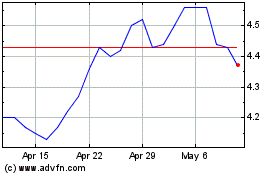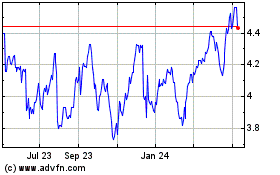By Ana García Ruiz and Jeannette Neumann
Telefónica SA's shares led losses on Spain's benchmark index
Thursday as investors eager for details on how the company plans to
whittle down its debt load came up empty-handed when it reported
second-quarter earnings.
The Spanish telecommunications giant also reaffirmed its
dividend despite calls from analysts to cut the payout to help trim
more than EUR50 billion, or around $55.3 billion, in debt.
Investors and analysts say they hope Telefónica executives
provide guidance on how the company plans to deleverage during a
conference call scheduled for 1 p.m. London time and 8 a.m. New
York time later on Thursday.
Telefónica shares were down 5.5% in midday trading in Madrid
despite second-quarter results that were broadly in line with what
analysts had expected. Analysts also noted that the decline comes
after a steady increase in Telefónica's share price over the past
month or so.
The company reported on Thursday that net profit was EUR693
million in the quarter versus EUR1.52 billion a year earlier. The
company said a decline in the currencies of Brazil, Argentina and
the U.K. versus the euro, as well as other currency fluctuations,
had shaved 9.1 percentage points off revenue in the second
quarter.
Revenue in the quarter was EUR12.72 billion, a 7.7% decline from
a year earlier. Operating income excluding depreciation and
amortization was EUR3.92 billion, a 7.1% drop.
Telefónica reiterated its targets with a dividend of EUR0.75
euros a share for 2016 because of what the company said was an
expected improvement in cash flow in the second half of the
year.
Investors have been seeking reassurance that Telefónica will
start to whittle down more than EUR50 billion in debt after the
European Commission blocked the company's sale of its British
mobile operator O2.
Telefónica had tried to sell 02 to cuts its debt load, but the
Commission said the acquisition by CK Hutchison Holdings Ltd. would
have resulted in higher prices and fewer choices for U.K.
customers, so it thwarted the sale.
Analysts at credit-rating firms warned that Telefónica still
needed to trim debt or risk a potential downgrade of its
investment-grade credit rating, which ensures that a broader range
of investors can buy its securities.
As Telefónica executives went back to the drawing board to
figure out what to do with O2 and how to protect the company's
rating, Britons voted to leave the European Union, throwing a
wrench in the company's efforts.
The week after Brexit, the telecommunications company announced
it would consolidate the British operator back into its financial
statements, no longer reporting O2's assets and liabilities as
"held for sale."
"Telefónica continues to explore different strategic
alternatives for O2 UK, to be implemented when market conditions
are deemed appropriate," the company said in a regulatory filing on
June 29.
While the regulatory, financial and economic uncertainty
unleashed by Brexit diminishes the appeal of O2, the company could
still try to sell the British operator again in the future,
analysts say. More likely, though, is that the Spanish company
seeks to deleverage by selling other assets or cutting the
dividend, analysts say.
Brexit hasn't been all bad for Telefónica, Javier Borrachero, a
telecommunications analyst at Kepler Cheuvreux, points out in a
July 11 research report.
Around 13% of the company's net debt is in pounds, he notes, and
the currency has dropped post-Brexit versus the euro.
Also, Brexit has pushed back expectations of an increase in
interest rates by the U.S. Federal Reserve, which has helped to
buoy emerging market currencies such as the Brazilian real.
Investors tend to pull money out of emerging markets if they
believe there will be higher interest rates, and therefore higher
returns, in the U.S.
Since that hasn't happened, the Argentine peso and the Brazilian
real--which had been a drag on earnings and Telefónica's share
price--have bounced back, while more market-friendly governments in
the region are also helping to brighten the outlook for the
telecommunications company, Mr. Borrachero says.
"Better macroeconomic and inflation prospects have also put an
end to the period of massive currency depreciation," Mr. Borrachero
wrote. "An increasing appetite for emerging markets risk is key for
Telefónica, as the stock is still seen as a Latin American
proxy."
On the other hand, if the Fed raises rates and that in turn
deflates emerging-market currencies, Telefónica's valuation could
suffer.
On Wednesday, the Fed held rates steady as expected but offered
little guidance on its future plans for monetary policy. Markets
had a muted reaction on Thursday.
Write to Jeannette Neumann at jeannette.neumann@wsj.com
(END) Dow Jones Newswires
July 28, 2016 07:29 ET (11:29 GMT)
Copyright (c) 2016 Dow Jones & Company, Inc.
Telefonica (NYSE:TEF)
Historical Stock Chart
From Mar 2024 to Apr 2024

Telefonica (NYSE:TEF)
Historical Stock Chart
From Apr 2023 to Apr 2024
